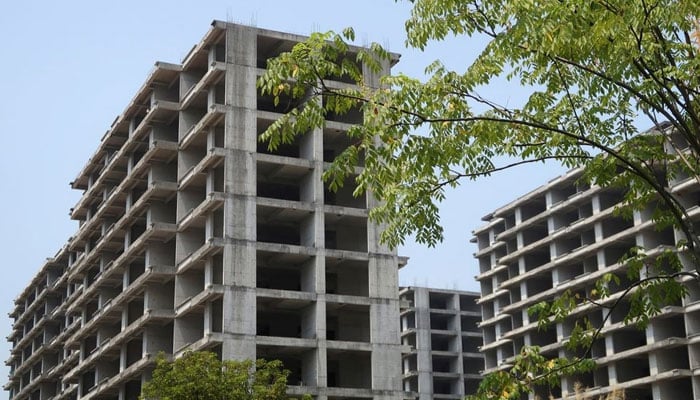Govt panel recommends tax relief for real estate, housing sector
Pakistan’s business council opposes real estate tax cuts, warns against policy changes benefiting major property dealers
February 02, 2025

- Prime minister task force's relief package subject to IMF approval.
- Miftah slams proposed exemptions, calling them 'illogical".
- Ex-finance czar says Pakistan's tax burden higher than elsewhere.
The Prime Minister’s Task Force on Housing has prepared a relief package for the real estate and housing sector recommending reduction in tax rate both for buyers and sellers.
The task force, headed by Minister for Housing Riaz Hussain Pirzada, has finalised a package which includes significant tax revisions and recommendations to revitalise the sector.
The task force’s proposals, presented to Prime Minister Shehbaz Sharif, suggest several measures to support the sector.
Some recommendations, if approved, would allow the construction of three-storeyed houses instead of two-storeyed residential buildings, offering full tax exemptions for first-time buyers of house and reducing property transaction taxes.
The task force has also recommended lowering the property sales tax from four percent to two percent, cutting the buyer’s tax from four percent to half percent, and eliminating federal excise duties on property transactions.
However, any rebate in taxes would be conditioned to permission of the International Monetary Fund, and the issue might be raised in Pakistan government’s meeting with the Washington-based lender, next month.
The recommendations also include providing housing subsidies for low-income individuals and offering loans for home construction through mortgage policy with repayment periods ranging from 15 to 20 years.
According to this policy under ‘Mera Ghar Mera Pakistan’, the plot would be mortgaged against release of loan for construction of house. It has also been recommended to increase taxable value of a house from existing Rs10 million to Rs50 million. It was also proposed to make the Real Estate Authority functional and place it under the minister of interior instead of the Ministry of Housing. The sources said that the prime minister has convened a meeting on February 03 to review the recommendations and make a final decision on the matter.
However, the Pakistan Business Council (PBC) expressed concerns over the recommendations of the task force. In a letter to the prime minister, the council has stated that there should be no changes in the tax policy related to the real estate sector.
The letter said that during a meeting with the council, the Federal Board of Revenue (FBR) chairman had hinted at a possible reduction in taxes for the real estate sector.
It stated that the FBR chairman had said that the buying and selling of plots face heavy taxation and that the government is reviewing the matter.
The PBC has urged the government to continue its efforts to expose black money in the plot trading business.
Ex-finance czar calls tax exemptions 'illogical'
Former finance minister Miftah Ismail rejected the tax exemptions, saying that the tax on individuals earning Rs100,000 per month had been doubled, when it was time to support salaried individuals.
He questioned how a person earning Rs200,000 per month could afford to build a house if they are taxed at 38%.
Ismail, who is a former member of the ruling Pakistan Muslim League-Nawaz (PML-N) called the tax exemptions given to major property dealers "illogical". He pointed out that the tax burden in Pakistan was higher than anywhere else in the world.
The ex-finance czar urged the government to reduce taxes on salaried individuals and stressed that the construction industry should be allowed to operate smoothly.
Miftah said that efforts should be made to reduce plot prices, as homeownership was becoming increasingly difficult for the poor, underscoring that 100 million Pakistanis were living below the poverty line, making job creation essential.
He also mentioned that privatisation and the closure of several ministries were proposed, but no action has been taken.












